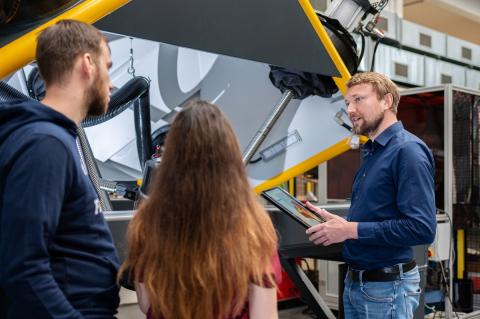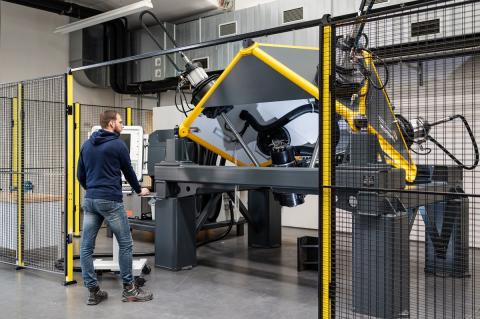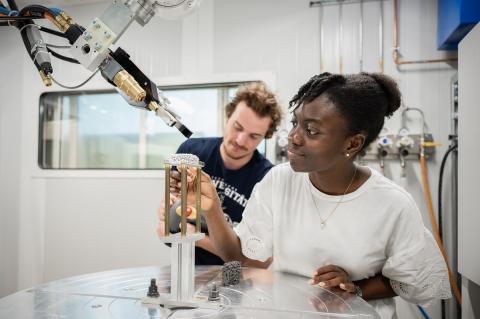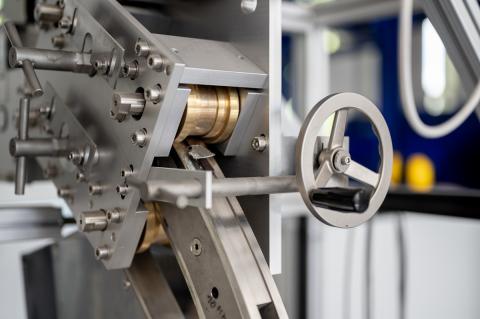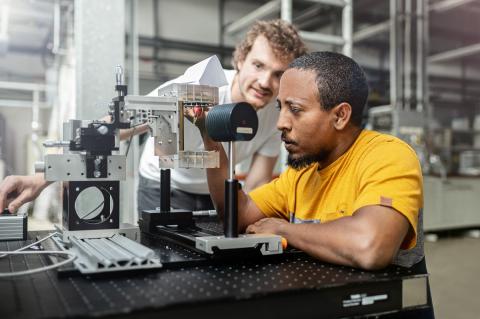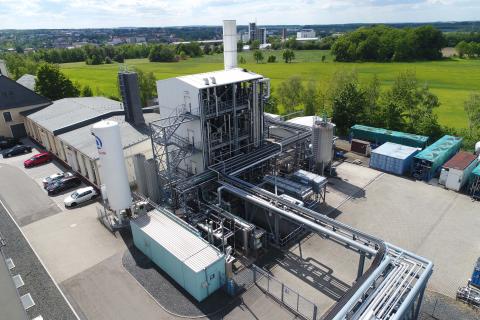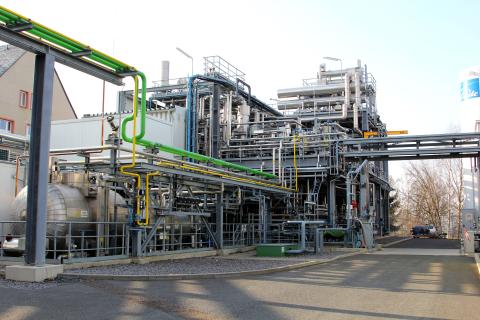Scientific expertise and industry-related research
The Faculty's proximity to industry and its scientific expertise are reflected in large-scale research projects funded by the BMBF or DFG and collaborative projects with partners from science and industry.
Outstanding technical equipment
Excellent technical equipment ranging from industrial-scale pilot research facilities to state-of-the-art laboratories form the basis for research and the practical training of students. Large-scale research projects funded by the BMBF or DFG and collaborative projects with partners from science and industry are evidence of the Faculty's proximity to industry and its scientific expertise.
Special research programmes
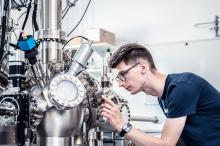
- DFG Collaborative Research Centre SFB 920: Multifunctional filters for molten metal filtration
- DFG Priority Programme SPP 2045 (Head of MVTAT): MehrDim Part - Highly specific multidimensional fractionation of technical ultrafine particle systems
- DFG Priority Programme SPP 2315 (Head MVTAT): EnAM - Engineered Artificial Minerals
- DFG Research Group FOR 3010: Multifunctional, coarse-grained, refractory composites and material composites for large-volume key components in high-temperature processes
- DFG Graduate School GRK 2802: Refractory recycling: A contribution to raw material, energy and climate efficiency in high-temperature processes
- BMBF Recycling Cluster: DIGISORT: Digitalisation of sorting processes LOWVOLMON: Sustainable recycling - process optimisation
- BMBF project Feuerwerk: Refractory material composite with improved thermal shock and corrosion properties for high-temperature applications in metallurgy (VIP+)
- BMBF hydrogen lead project H2Giga: ReNaRe - Recycling Sustainable Resource Utilisation
- BMBF Cluster greenBatt: DIGISORT cluster - Digitisation of sorting processes / LOWVOLMON cluster - Monitoring of low-volatility electrolytes in the mechanical recycling process chain
- BMBF cluster InfraDatRec: Infrastructure to improve data availability for the digitalisation of battery recycling
- BMBF - Verbund ReAktiv: Mechanical processing of electrode coatings for their direct reuse
- BMBF - Verbund DiLiRec: Recycling of lithium iron phosphate (LFP) batteries using optimised black mass recovery
- BMBF - Verbund Car2Car: Circular, sustainable vehicle recycling concepts
- IGF lead technology project TherMonia-LowNOx
Ammonia as a sustainable energy source for thermoprocess technology
Low-pollutant combustion of ammonia in thermoprocess technology
- IGF lead technology project TherMonia-NitriCor
Ammonia as a sustainable energy source for thermoprocess technology
TV: Investigation into corrosion and nitrogenisation when using ammonia in thermal process technology
- FORKA joint project Emilia
Emission avoidance through laser ablation for use in nuclear decommissioning
TP: Development of a laser ablation process for the effective destruction of surface layers
- BMWK joint project Hymetal: Hybrid production of metalloceramic functional components for various industrial sectors
- BMWK joint project Hybrid-FIRE: Hybrid furnace process for CO2-poorer or for CO2-free high-temperature technologies for the thermal treatment, melting or production of inorganic materials
Funded junior research groups
- BMBF Junior Research Group PurCo:
Purification of copper - Contributions to copper smelting filtration and recycling of copper scrap
Junior Research Group Leader: Dr.- Ing.Claudia Voigt
Supervisors: Mr Prof Aneziris (Faculty of Mechanical, Process and Energy Engineering), Mr Prof Charitos (Faculty of Materials Science and Technology)
- ESF Plus Junior Research Group AddWasserstoff:
Sustainable additively manufactured high-temperature materials for hydrogen processes
Head of the junior research group: Dr.-Florian Kerber
Supervisors: Prof. Aneziris, Prof. Kiefer, Prof. Fieback, Prof. Krause (Faculty of Mechanical, Process and Energy Engineering)
- ESF Plus Junior Research Group IN-BAF:
Innovative component and material design for additive manufacturing
Supervisors: Mr Prof. Kröger, Mr Prof. Zeid. Kröger, Prof. Zeidler (Faculty of Mechanical, Process and Energy Engineering), Prof. Biermann, Prof. Volkova (Faculty of Materials Science and Engineering). Volkova (Faculty of Materials Science and Technology)
- ESF Plus junior research group QualiGlas:
Predictive evaluation of glass quality in future technologies for sustainable, CO2-emission-neutral glass production
Supervisors: Ms Prof. Fuhrmann, Prof Richter (Faculty of Mechanical, Process and Energy Engineering)
Research focus of the institutes
Institute for Processing Machines and Recycling Systems Technology
- Processing machines and environmental technology
- Process and machine engineering studies
- Construction methodology and calculation methods:
- Provision of tools for the systematic construction of machines and plants for processing technology and environmental protection (construction methodology, neural networks, CAD, FEM, CFD, DEM etc.).
- Agglomeration technology
Conception and optimisation of agglomeration methods for organic and inorganic raw materials
Development of alternative binders for the agglomeration of bulk products - Processing of renewable raw materials
Combination of basic process engineering operations for the processing of renewable raw materials with the highest refinement effect - Recycling
Comminution of non-brittle waste and renewablebrittle waste and renewable raw materials to achieve defined granulometric product properties
Selective comminution of waste mixtures - Mineralogy
Studies on the crushability of mineral materials
Institute for Automation Technology
- Motion planning of extraterrestrial autonomous working machines
- Regional virtual power plant based on mini and micro CHP technology
- Monitoring and efficient control of small energy systems
- Automation of decentralised energy systems
- CO2 data acquisition and monitoring system
- Modelling of diffusion experiments in metal melts
- Automation of digital printing lines
- Model and monitoring system
- Automation of diffusion experiments in metallic melts
- Automation of digital printing lines
- Modelling and control of high-temperature processes in multi-zone furnaces
- Internet-based monitoring and control of automation processes
Professorship for Automated and Autonomous Systems
- Human-Machine Systems researches the optimal cooperation between humans and technology - from exoskeletons and assistance systems to basic models for describing corresponding support situations.
- Automation develops modern solutions - data-based, adaptive and robust
Institute of Electrical Engineering
- Electrification of the powertrain
Investigation of possible electric motor concepts for hybrid and electric vehicles and electric vehicles
Design of driving cycle-optimised drives with high power density - Control of electric drives using observers
Development of robust observers for non-measurable variables
Minimisation of dynamic stresses in the mechanical drivetrain - Mathematical modelling and digital simulation of asynchronous and synchronous machines
Further development of mathematical machine models
Software development - Identification of the parameters of asynchronous and synchronous machines
Procedures for both standstill and FOR controlled operation
Avoiding the differentiation of state variables by using MOD functions
Institute of Energy Process Engineering and Chemical Engineering
Professorship of Energy Process Engineering
Professorship of Reaction Engineering
Professorship of Modelling of Thermochemical Conversion Processes
Institute for Glass and Glass Technology
- Basic and applied and applied research on glass technology
- Optimisation of batch technology
- Modelling of glass technology processes
- Glass recycling and utilisation of residual materials
- Refinement of glassy surfaces
- Enamels and enamel technology
- New methods of thermal and chemical hardening
- New measuring methods for process monitoring
- Glass fibre technology
- Fibre Methods of thermal and chemical hardening
- New measuring methods for process monitoring
- Glass fibre technology
- Fibre-reinforced building materials
- Foam glass technology
Institute for Ceramics, Refractories and Composites
- Development of thermal shock and corrosion resistant ceramics, refractories and building materials for applications in metallurgy, steel industry, cement, lime, glass industry and energy technology
- Electrification of high-temperature processes (microwave plasma burners, carbon-free and low-carbon electrodes)
- Development of new hybrid firing technologies for high-temperature processes
- Recycling and upcycling of refractories and building materials
- Generative manufacturing and 3D hybrid processes (3D spaghetti extrusion for filter production, 3D alginate route, gelcasting, roboflamespraying)
- 3D printing (selective laser sintering - SLS, fused filament fabrication - FFF, Binder jetting, direct extrusion)
- Refractory composites
- Metal-ceramic composites
- Alkali-corrosion resistant building materials and thermal insulation materials for the cement industry and aluminium molten flux electrolysis
- Porous ceramics for high-temperature applications (molten metal filters, thermal insulation materials, reactor surfaces)
- Further development of classic manufacturing technologies (casting moulding, plastic moulding, uniaxial press moulding, isostatic press moulding)
- Development and application of modern manufacturing and functionalisation techniques (pressure slip casting, pulsating CIP, flame spraying, electrospinning)
Institute of Mechanical Engineering
Professorship Networked Mobile Machines
- DeepSea Sampling: In this joint project, a consortium of seven partners is developing a template with which vertical ore mining can be carried out in the deep sea
- Conceptualisation of tool change: Investigations into the possibility of wear detection on tools and technical solutions for changing tools under water
- Position determination: Investigation of sensor systems and the possibilities for sensor data fusion for alignment and position determination under water
- SMS minerals: Investigation of properties relevant to the mining of minerals and experiments to estimate mining conditions
- Pressure-tight design of sensor systems
- Conception of semi-autonomous working systems
- Sensor data acquisition, analysis and transmission with limited bandwidths
- Control and regulation of drives using position data
Junior Professorship for Measurement, Sensor and Embedded Systems (MSE Lab)
- We conduct research at the MSE Lab on novel measurement and sensor systems in order to better understand and optimise complex processes.
Institute for Machine Elements, Design and Manufacturing
Professorship Machine elements
- Design and experimental investigation of tribologically loaded machine elements (seals, bearings, brake pads)
- Experimental investigation and modelling of tyre-road contact
- Determination of contact pressure, deformation, friction and heating
- Design of the service life of machine elements (screws, wire ropes, bearing cages).
- Determination of the fatigue strength of machines and systems
- Predesign of components of the front end structure
- Component tests on the crash test rig
- Topology optimisation (additively manufactured components, notched components)
Professorship Additive manufacturing
- Comprehensive optimisation of the additive manufacturing process chain, production planning
- Investigation and development of innovative manufacturing processes with a focus on additive processes
- Investigation and development of novel materials for additive manufacturing with a focus on renewable or bio-based starting materials and residual materials
- . biobased raw materials and residual materials
- Design of additive manufacturing processes and machines
- Surface smoothing of complex metallic components using plasma electrolytic polishing
- Design for additive manufacturing
Institute of Mechanics and Fluid Dynamics
Institute of Mechanical Process Engineering and Mineral Processing
Research at the Institute of Mechanical Process Engineering and Mineral Processing covers the entire field of mechanical process engineering with a focus on particle technology and the processing of mineral and secondary raw materials. A particular focus is on particle systems and particle-particle interactions in non-aqueous liquids (organic solvents).
By analysing the interactions between individual particles, in particle collectives and between particles and the surrounding medium in detail, it is possible to describe the process laws of a large number of basic operations in mechanical process engineering - e.g. filtration and washing, sorting and classifying, grinding, dispersing and agglomerating. Building on this, specific developments in the areas of particle-filled composite materials and preparation processes are being driven forward.
All work focuses on the technical application and implementation, i.e. the apparatus technology of mechanical process engineering.
Institute of Thermal Process Engineering, Environmental and Natural Materials Process Engineering
Institute of Thermal Engineering
Professorship for Technical Thermodynamics
- Determination of thermophysical material data
- Numerical simulation in the design phase of self-developed equipment
- Experimental determination of heat transfer coefficients
- Visualisation of flows
- Geothermal energy
- Flows with coupled transport processes
- Flows with free surfaces (film flows)
Professorship for Gas and Heat Technology
- Gas Technology and Energy Technology: Integration of climate-neutral energy sources into the gas supply (hydrogen, biogas); gas production and processing; energy storage, system-analytical questions of energy and gas supply; production of hydrogen and biogas
- Combustion Technology: Determination of combustion-related properties of gases and gas mixtures, particulary renewable gases; in particular renewable gases; development of combustion systems for industry and commerce; measures to reduce emissions; Flame diagnostics with laser techniques
- Thermal process technology: Energy efficiency measures on and development of thermal process plants; application behaviour of high-temperature materials (wear and corrosion); hybrid technologies (microwave technologies, plasma processes)
- Numerical modelling: modelling of mass and heat transport; modelling of fluid dynamic processes in porous media, reactions in flows (combustion)
